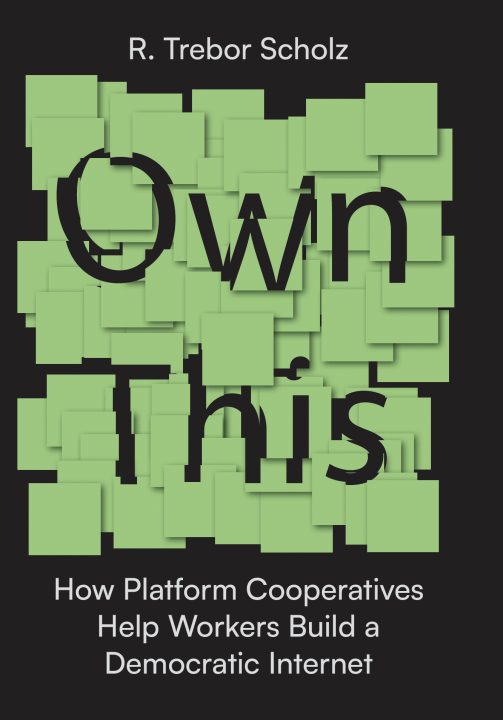Own This! How Platform Cooperatives Help Workers Build a Democratic Internet by R Trebor Scholz Verso, £16.99 (US$26.95)
As the multiple crises facing the world – including economic inequality, the erosion of working rights and the rise of authoritarian populism – deepen, a swathe of books, many reviewed here, have touted the co-op model as a ready path to a sustainable and equitable new economy.
Next up to share his thoughts is Trebor Scholz with Own This!, taking a focus on platform work in the digital age; as a leading light of the platform co-op movement, he turns in a thoughtful and intensively researched look at the issues in hand.
Scholz paints a stark picture of the platform economy where “methods of workplace surveillance are far more invasive than those of the early 20th century – let’s say in Amazon’s warehouses, where a worker’s location is known at all times”.

Hope, he says, comes in the form of “co-operative models offering a partial but readily available shield for workers”. This solution – already being tested around the world through the burgeoning platform co-op movement – offers a future where people have greater control over the digital economy through ownership of its apps, platforms, and protocols. Scholz suggests ideas such as “a federation-led ride-hailing platform that utilises not only its technological know-how but also its convening power to support worker co-operatives of taxi drivers on a global scale”, or inner-city communities implementing a co-operative high-speed internet infrastructure to close the digital divide.
Such notions are particularly important in sectors like social care, with an ever-ageing population to be looked after, and domestic work, where a large cohort of women and undocumented workers is at risk of exploitation. Scholz gives the example of Up & Go, a worker-owned digital platform in Brooklyn, NYC, whose workers earn $25 per hour, more than twice the $11 they could expect through conventional channels.
To spread such benefits, Scholz suggests “a global ecosystem of platform co-ops … where labour platforms, social media and web infrastructure operate in perfect sync. Labour platforms function as generators, while social media and other internet platforms act as the circuits, all guided by co-operative principles, working toward a more fair and democratic internet”.
Related: Next steps for co-op alternatives in the gig economy
Which is all well and good: but the next question is, how do we get there?
Part of the answer, he says, comes from new tech itself: blockchains, crypto, Web3, and decentralised autonomous organisations (DAOs) offer ways “to re-envision traditional co-operatives and the way tech start-ups function”.
This could require a rethink of co-operation, he argues. As tech collectives “explore and experiment with co-operative principles” and labour markets shift online, the International Cooperative Alliance (ICA) “must boldly embrace technological transformation”. The ICA, he says, can “actively promote and support experiments aimed at establishing the co-operative identity in the digital economy. This includes negotiating data standards for a worldwide co-operative data commons, starting perhaps in the agriculture sector”.
There are other issues, such as scale: Scholz looks back on the unsuccessful campaign to mutualise tech giant Twitter, saying the acquisition of the platform by Elon Musk underscores the need for democratic control of social media. He suggests that, for now, creating smaller co-op alternatives is a more feasible goal.
More widely, he says, the replication of successful co-op models, or building co-op federations along the lines of Spain’s Mondragon and India’s SEWA, is more realistic and conducive to member control than trying to create an Amazon-sized co-op.
There are also cultural barriers, with countries like the US needing to move the Overton window of opinion so that co-ops are more widely seen as a serious option. He frames this issue as a vital question: “Do we condone granting control of vital aspects of our lives, such as healthcare, food supply, transportation systems, and education, to a handful of corporations? The resounding answer is no, which compels us to ensure that tech giants are held accountable to antitrust regulations, and to recognise co-operatives as a viable antidote.”

